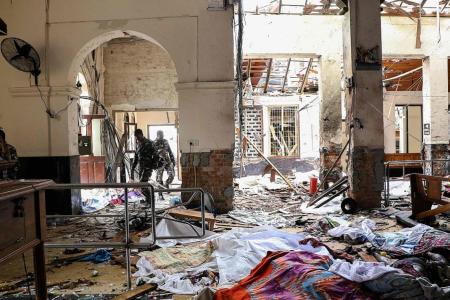Sri Lankan church blast rescuer: It was a river of blood
More than 200 killed, hundreds injured in bomb attacks on three churches and four hotels in Sri Lanka
COLOMBO: At one hotel, a man waited patiently in a breakfast buffet line until he got to the front.
He then blew himself up, spreading death and chaos.
The suicide attack was one of several explosions that ripped through three churches and four hotels in Sri Lanka yesterday, killing more than 200 people and injuring hundreds more.
The coordinated attacks shattered the calm of Easter Sunday as the blasts, which occurred within minutes of each other, wreaked havoc among Christians attending Easter Mass in churches in three cities, and the guests, including foreigners, of three high-end hotels in the capital of Colombo.
At least 35 of the dead were reported to be foreign tourists, including Americans, Europeans, the Japanese and Chinese.
The Sri Lankan authorities later arrested seven people in a raid on a house, during which three policemen were killed in a blast.
An eighth suspect was arrested later.
They did not identify the suspects or attribute the attacks to any organisation, and no one had yet claimed responsibility.
AFP reported that Sri Lankan police chief Pujuth Jayasundara had issued an alert 10 days ago, warning that radical Muslim group National Thowheeth Jama'ath was planning suicide attacks on "prominent churches".
The three churches hit were St Sebastian's Church in Negombo, St Anthony's Shrine, a tourist landmark in Colombo, and Zion Church in Batticaloa.
More than a thousand people, many from villages, had turned up at St Sebastian's for a joyous day, only to face death and devastation.
Father Edmond Tillekeratne, social communications director for the Archdiocese of Colombo, told CNN that three priests were celebrating mass when the blast occurred.
Two were badly injured by flying glass and debris, and one escaped serious injury because he was behind the altar.
He said the ground was covered in rubble and shattered glass.
"You can see pieces of flesh thrown all over the walls and on the sanctuary and even outside of the church," he added.
More than 50 people were killed in the gothic-style church, AFP reported.
At St Anthony's in Colombo, a Reuters source in the police bomb squad said: "Our people are engaged in evacuating the casualties."
Photos circulating on social media showed its roof had been almost blown off.
The floor was littered with a mixture of roof tiles, splintered wood and blood.
Several people could be seen covered in blood, with some trying to help those with more serious injuries.
The images could not immediately be verified.
"It was a river of blood. Ash was falling like snow," said Mr N.A. Sumanapala, a shopkeeper near St Anthony's who said he ran inside to help.
"The priest came out and he was covered in blood, and he seemed be covered in someone else's skin," he said.
The three luxury hotels hit were the Shangri-La, the Kingsbury and the Cinnamon Grand. The Tropical Inn near the national zoo was attacked later.
At the Cinnamon Grand, the suicide bomber, who registered as Mohamed Azzam Mohamed the night before, was about to be served when he detonated his bomb jacket in the packed restaurant, a manager in the hotel said.
"There was utter chaos," said the manager, who spoke to AFP on condition of anonymity.
"It was 8.30am and it was busy. It was families," he said.
"He came up to the top of the queue and set off the blast. One of our managers who was welcoming guests was among those killed instantly."
Parts of the bomber's body were found intact by police and taken away.
Other hotel officials said the bomber, a Sri Lankan, had used a false address to check in.
A tourist at the Shangri-La told the ABC she was at a second-storey eatery when two blasts occurred about 10 seconds apart.
"There was just screaming and everywhere I looked there was blood," she said, adding that the area had been full of visitors, including children.
"Everyone was just hiding, trying to work out what had just happened and what was going to happen, and we just didn't know."
A Singaporean on holiday in Colombo told The New Paper that when he drove past one of the bombed hotels, he thought it was a fire or a strike.
The 23-year-old said: "It was surprising, to say the least, when I learnt that it was a series of bombings. There were ambulances and fire engines scrambling."
Get The New Paper on your phone with the free TNP app. Download from the Apple App Store or Google Play Store now



